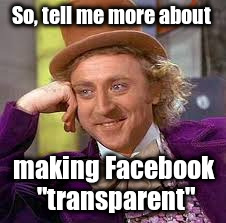Er.. No, sorry: Facebook CANNOT provide transparency
Requests that Facebook “opens up its algorithms” continue to come. Because nobody seems to realize that, no matter how surely well-meaning those proposals are, they are structurally impossible to satisfy, on any centralized platform like Facebook.
As of writing, the most recent request of this kind seems the one inside “Without Transparency, Democracy Dies In The Darkness Of Social Media”:
“For a company that seeks to examine the role it plays in democracy, the most logical first step would be for Facebook to start its journey of self discovery with transparency, providing its two billion users with even the most cursory insight into how its platform actively shapes and moderates their online lives.”
The way in which Facebook (or again: ANY platform with the same centralized architecture!) “actively shapes and moderates their online lives” is by “combining” its algorithms and policies with real time complete data (that is ALL the status updates, likes, location info, everything) by ALL its users. On its own servers.
Algorithms and policies are nothing without data. COMPLETE data
Facebook may integrally publish all its algorithms and policies, and you would still have no real guarantee that they are the same algorithms and policies actually doing the real “shaping and moderating” on Facebook' servers. Nor could you have any confidence that there are no “tricks”, or bugs in those algorithms, without looking at the real, complete data they process.

Making Facebook really transparent? Yeah, right.
</em></u>
Can you see the problem now? No centralized platform like Facebook can provide real transparency, or any transparency we may really be comfortable with. Because the only way to do so would be to provide full, real-time access on its servers, not just to the algorithms, but to the whole, complete, often “private” posts, pictures, liked posts, websites visited, chat metadata, everything… of every users. Basically, they would have to break every definition, law and social norm on privacy ever conceived. This is why I repeat (the last time this morning…) that the fix for anything like Facebook cannot be anything like Facebook.
Oh, and of course…
… please don’t even TRY to suggest that the solution is to grant access to the complete data to “trusted experts”, or to any government. First, which experts? Second: which government? On global platforms there are no governments or borders. Why should (just to make things “simple”) the USA government control Russian Chinese citizens, or the other way around? Third: government? Replacing corporate surveillance with state surveillance? Are you serious? Fourth, and final: the right way to deal with these issues is to create architectures that work even if you cannot trust anybody.
Who writes this, why, and how to help
I am Marco Fioretti, tech writer and aspiring polymath doing human-digital research and popularization.
I do it because YOUR civil rights and the quality of YOUR life depend every year more on how software is used AROUND you.
To this end, I have already shared more than a million words on this blog, without any paywall or user tracking, and am sharing the next million through a newsletter, also without any paywall.
The more direct support I get, the more I can continue to inform for free parents, teachers, decision makers, and everybody else who should know more stuff like this. You can support me with paid subscriptions to my newsletter, donations via PayPal (mfioretti@nexaima.net) or LiberaPay, or in any of the other ways listed here.THANKS for your support!